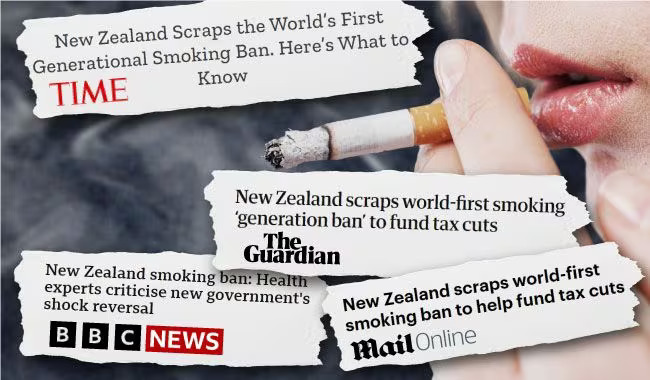The fresh government in New Zealand is hinting at ditching the globally praised smoking ban to fund tax cuts.
The New Zealand smoking ban policy reversal

The earlier government, led by Jacinda Ardern, had set the wheels in motion to ban cigarette sales in the coming year for those born after 2008. The goal? Putting the brakes on smoking, which happens to be the top preventable cause of death in New Zealand, especially among the younger crowd. Now, health experts are not holding back in expressing their disappointment over this unexpected policy U-turn.
“We’re utterly shocked and disappointed…this feels like a major step backward from the outstanding health measures we once championed globally,” expressed Prof Richard Edwards, a dedicated researcher in tobacco control and public health at the University of Otago.
“The majority of health advocates in New Zealand are dismayed by the government’s decision and are urging them to reconsider,” he emphasized in conversation with the BBC.
Just last year, the widely praised legislation made waves globally, earning accolades for its groundbreaking reforms. The measures were a hit, involving a cap on tobacco retailers and a nicotine reduction in cigarettes. Research models even hinted that these Smokefree laws could potentially save around 5,000 lives annually.
Interestingly, New Zealand’s progressive laws seemed to have influenced the UK government, which, in a September move, announced a parallel smoking ban for the younger demographic. Despite New Zealand’s recent policy shift, a spokesperson assured that Prime Minister Rishi Sunak’s stance on the matter remains unwavering.
Even though the Smokefree measures received applause as a public health policy, there was pushback from certain business circles in New Zealand. Owners of local shops and newsagents weren’t thrilled, expressing concerns about revenue loss, even with government subsidies in the mix.
Adding to the mix, some lawmakers, including the new Prime Minister Chris Luxon, chimed in with worries that a ban might create an underground market for tobacco. Different perspectives, but all part of the ongoing debate.
Surprisingly, the National Party, securing 38% of the vote in the recent October election, didn’t bring up the Smokefree laws during their campaign. The bombshell came on Saturday when the new finance minister, Nicola Willis, announced the government’s intention to repeal these laws – catching health experts off guard, as they thought this policy would stay put.
In a twist of events, Willis revealed that National’s coalition partners, the populist New Zealand First and the libertarian Act, were adamant about rolling back the laws. Despite their election win, the centre-right National Party faced a bit of a hurdle in policy negotiations with these two smaller parties, stretching the process for weeks after the election. It was only on Friday, six weeks post-election, that a deal was reached, paving the way for the new government to be sworn in on Monday. Notably, New Zealand First, securing 6% of the vote, had been the sole party openly advocating for the repeal of the smoking laws during their campaign.
The smaller parties threw a wrench into the works by blocking the National Party’s big plan to open up foreign property ownership—a move the National Party had banked on for funding tax cuts for the middle and higher-income earners. Finance Minister Nicola Willis spilled the beans on Saturday, explaining that this setback prompted them to explore other avenues.
“It’s crucial to remember that the tweaks to the Smokefree legislation had a hefty impact on the government’s finances, to the tune of about a billion dollars,” she shared on New Zealand broadcaster TV3’s Newshub Nation.
Although the laws still need a formal repeal through parliament, where the government holds the majority, the prospect of financing tax cuts through the pockets of smokers has stirred shock and dismay.
Prof Robert Beaglehole, chair of New Zealand’s Action for Smokefree 2025 committee, expressed his astonishment, saying, “The suggestion that tax cuts would be paid by people who continue to smoke is absolutely shocking.”
The Latest Market Thinking From The World’s Finance Experts
Hāpai Te Hauora, a national Māori health organization, labeled it an “unconscionable blow to the health and wellbeing of all New Zealanders.” This move is particularly impactful for New Zealand’s indigenous Māori population, where smoking rates and related health issues are highest. Experts had anticipated that the Smokefree policy would make a significant positive impact in this community.
“This decision goes against public opinion and contradicts the views of the majority of people in this field—health professionals, doctors, nurses,” emphasized Prof Edwards.
Back in 2022, public health modelling had predicted that the Smokefree policy could save New Zealand’s health system around NZ$1.3bn (£630m; $790m) over the next two decades. Despite the recent setback, New Zealand maintains its commitment to reducing the national smoking rate to 5% by 2025, ultimately aiming for complete elimination. Encouragingly, over 80,000 adults kicked the habit in the past year, according to national data, but about 8% of the adult population still smokes.

